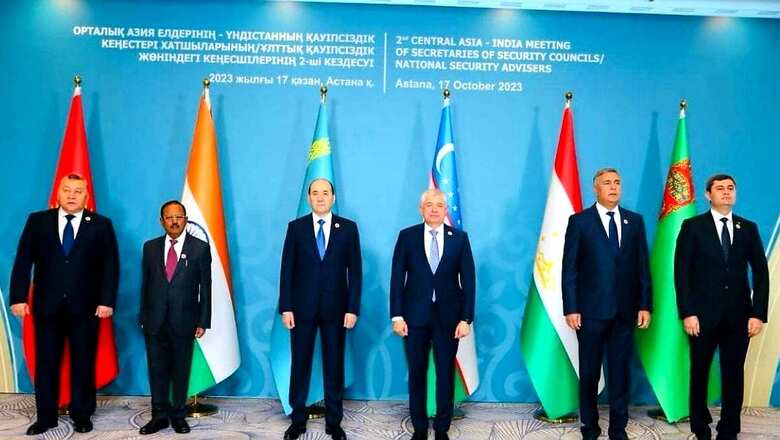
views
National Security Adviser (NSA) Ajit Doval participated in the second meeting of the India-Central Asia Secretaries/National Security Advisers of the Security Councils in Kazakhstan on Tuesday.
The first India-Central Asia Meeting of National Security Advisers/Secretaries of Security Councils was held on December 6, 2022, in New Delhi. The meetings flow from the agreement reached during the first India-Central Asia Summit (January 27, 2022) on holding regular meetings of Secretaries of the Security Council to discuss issues of regional security.
The second meeting of this mechanism was hosted by Kazakhstan. The National Security Advisers/Secretaries of the National Security Councils of the Republic of India, the Republic of Kazakhstan, the Kyrgyz Republic, the Republic of Tajikistan and the Republic of Uzbekistan participated in the meeting. Turkmenistan was represented by their Embassy in Astana.
THE KEY POINTS MADE BY NSA
The relations between India and the Central Asian countries, including in the political, trade, economy, security and defence fields, have transformed into multifaceted and mutually beneficial relations based on mutual trust, understanding and friendship. Central Asia and India face common security challenges and threats. Malign actors from interconnected networks threaten our shared neighbourhood.
CONNECTIVITY
Connectivity and economic integration with the Central Asian countries is a key priority for India. However, while promoting connectivity, it is important to ensure that connectivity initiatives are consultative, transparent and participatory. They should respect sovereignty and territorial integrity of all countries. They should also adhere to environmental parameters, ensure financial viability and not become debt burdens.
”In this context, the absence of direct land access between Central Asia and India is an anomaly. This absence of direct connectivity is the result of a conscious policy of denial by a particular country. This situation is not only self-defeating for this country, but it also reduces the collective well-being of the entire region,” he said.
”India is a member of both the International North-South Transport Corridor (INSTC) and the Ashgabat Agreement. Invited Central Asian neighbours to utilise the Chabahar port as well as its Shaheed Bahesti terminal operated by an Indian company for maritime trade and solicited support for including Chabahar port within the framework of INSTC. Both Uzbekistan and Turkmenistan will be joining the INSTC soon. With this, all the five Central Asian countries will be a member of the INSTC,” said Doval.
DIGITAL PUBLIC INFRASTRUCTURAL/DIGITAL PAYMENT SECURITY
Ready to provide technology patented by our Central Bank known as United Payment Interface (UPI) free of cost to Central Asian countries for their independent use. “Facilities setting up of sovereign digital real time payment systems in accordance with the need and requirement in your countries. Such a system will greatly enhance commercial linkages and be benefit people who may have to travel to India for medical treatment. It will also help businessmen and Indian students who are studying in your countries,” he said.
RARE EARTHS COOPERATION/STRATEGIC MINERAL COLLABORATION
Proposed to set up an India-Central Asia Rare Earths Forums to escape possible partnerships in the domain of rare earth and strategic minerals. This will also facilitate the participation of Indian private companies in this region for investments and joint economic development.
“Such collaboration should be mutually beneficial, transparent and designed to meet long term requirements,” he said.
TERRORISM
Terrorism, in all its forms and manifestations continues to constitute one of the most serious threats to international peace and security. Any act of terrorism, regardless of its motivation or cause, is unjustifiable.
The NSA offered fully funded capacity building programmes in a wide range of areas.
DRUG TRAFFICKING
Drug trafficking is a serious menace and is often leveraged by terrorist organisations and organised crime gangs. Need to coordinate closely to eradicate this menace. The NSA offered fully funded capacity building programmes in a wide range of areas.
CYBER SECURITY
Capacity building and sharing of experience are the corner stones to strengthen cooperation in this domain. India will work closely with Central Asian countries to help them build defences against cyber-threats and create a secure cyber ecosystem. India invited the Heads of the Cyber Security Agencies of all the Central Asian countries to India for a strategic cyber experience.
AFGHANISTAN
The situation in Afghanistan remains a cause of concern. “Our common immediate priorities include providing humanitarian assistance, ensuring formation of a truly inclusive and representative government combating terrorism and drug trafficking and preserving the rights of women, children and them minorities. India is deeply involved in the humanitarian assistance being provided to the Afghan people,” said the NSA.
“In line with India’s approach to encourage sports in Afghanistan, the Afghan Cricket Team is in India to play in the ICC World Cup matches. Amul, an Indian company, is the principal sponsor of the Afghanistan national cricket team for the ICC World Cup,” said Doval.
PEOPLE-TO-PEOPLE LINKAGES
Strongest bond between Indian and Central Asia is the extensive cultural linkage and people-to-people ties. India will organize a seminar in India between leading scholars and ulemas from India and the Central Asian countries. This will also facilitate a deeper understanding of the history and context of Islam and its role in fostering peaceful coexistence and social harmony in today’s complicated world.
This meeting is being held when the world is witnessing great challenges. Dialogue is the only answer to settling difference and disputes. Diplomacy must be at the Centre of all conflict resolution initiatives. India stands for deep meaningful and sustainable engagement with all Central Asian countries.
The NSAs of Central Asian Countries appreciated India’s proposals to further strengthen India-Central Asia linkage including through capacity building. The participants underscored the importance of regular dialogue between the Security Councils of their countries in view of the common challenges of terrorism, extremism and radicalisation in the region. The participants agreed that the third meeting of the India-Central Asia National Security Advisers/ Secretaries of the Security Councils will be held in the Kyrgyz Republic in 2024.


















Comments
0 comment